A Study of the Idea of Crisis in Husserl’s View and its Background in the 19th Century European Philosophy
Subject Areas : ریشهشناسی مکاتب و آراء فلسفی در ادوار قدیم و جدید
Seyyed mas‘ud Seyf
1
,
Afshin Mo’azzen
2
*
![]()
1 -
2 -
Abstract :
At the beginning of the 20th century a vast trend which was unanimously called “the crisis of European science and culture” by its advocates emerged in Europe. Following the same trend, Husserl, one of the distinguished European thinkers of the early 20th century, introduced phenomenology as a solution to overcome this full-scale crisis, which, in his view, dominated Europe during the second half of the 19th century. He maintained that this crisis manifested itself in the form of absence of unity and coherence in philosophy and sciences (both natural and human sciences), as well as in the alienation of sciences from people’s everyday life. Husserl argued that the roots and causes of this crisis must be sought in the scientific and philosophical approaches of the 19th century Europe. During this period and after the demise of Hegel, certain schools such as Marxism, biologism, and historical hermeneutics appeared under the influence of Hegelian schools and the idea of historical relativism that they advocated. A common feature of all of them was their interest in relativism. Each of these schools, through negating the possibility of achieving a single and certain truth and also relativising it based on its own principles provided the context for the development of the above-mentioned crisis. After disclosing the nature of crisis in the philosophical principles of the West and through presenting a critical interpretation of Cartesian fundamentalism. Husserl suggested a method called “phenomenological interpretation” in order to have access to a solid and unifying basis for sciences. In spite of the several criticisms targeting this method, it has turned into one of the most fundamental phenomenological elements which has influenced a11 the philosophical schools which were developed after this prominent philosopher.
اسپيگلبرگ، هربرت، جنبش پديدارشناسي: درآمدي تاريخي، ترجمه مسعود عليا، تهران، مينوي خرد، ج1، چ2، 1392. #
راسل، برتراند، تاريخ فلسفة غرب، ترجمه نجف دريابندري، تهران، شركت سهامي كتابهاي جيبي، ج3، چ2، 1351. #
شجاعي، مالک؛ بادامچي، نفيسه، «بازگشت از راه استراسبورگ/هانري کربن و تاريخنگاري فلسفه اسلامي»، سوره انديشه،50، 1390. #
عارفي، عباس، «تاريخچة نسبيگرايي در فلسفة علم»، فصلنامه ذهن، ش19، 1383. #
كاپلستون، فردريك چارلز، تاريخ فلسفه غرب(از فيشته تا نيچه)، ترجمه داريوش آشوري، تهران، علمي و فرهنگي، ج7، چ5، 1388. #
هوسرل، ادموند، ايدة پديدارشناسي، ترجمه عبدالكريم رشيديان، تهران، انتشارات علمي و فرهنگي، چ3، 1392 ب. #
هوسرل، ادموند، تأملات دكارتي: مقدمهيي بر پديدارشناسي، ترجمه عبدالكريمرشيديان، تهران، نشر ني، چ5، 1392الف. #
هوسرل، ادموند، فلسفه بمثابه علم متقن، ترجمه بهنام آقايي و سياوش مسلمي، تهران، نشر مركز، 1389. #
Baghramian, Maria, Relativism(The Problems of Philosophy), London, Routledge, 2004. #
Buckley, R. Philip, Husserl, Heidegger and the Crisis of Philosophical Responsibility, New York, Springer, 1959. #
Feest, Uljana, “Husserl’s Crisis as a Crisis of Psychology”, Studies in History and Philosophy of Science: Part C, 43(2), 2012. #
Richards, J., Robert, Darwin’s Metaphysics of Mind, Darwin and Philosophy, ed. vittorio Hoesl an christisn Illies, Notre dam, Notre dam University Press, 2005. #
Rockmore,Tom, Before and after Hegel(A Historical Introduction to Hegel’s Thought), California, University of California Press, 1993. #
Smith, D.W., Husserl, London and New York, Rutledge, 2007. #

